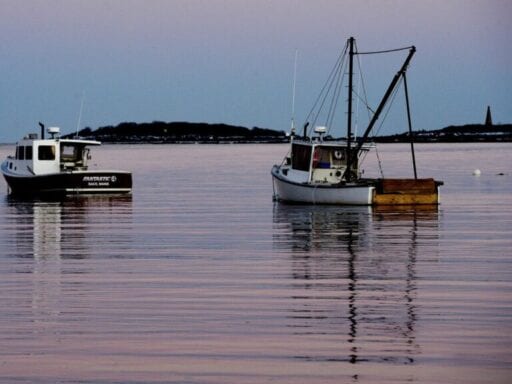The lobster bailout, explained.
The Maine lobster industry, which has been battered for years as a result of the Trump administration’s trade war with China, got some good news Wednesday. The president unexpectedly announced that the lobster industry will be eligible for bailout funds that had previously only been given to farmers and ranchers.
Trump being Trump, he portrayed this not as what it is — a course correction aimed to belatedly limit the collateral damage of his own policy ideas — but rather as an effort to rescue coastal Maine from the depredations of the Obama administration which he claimed “destroyed the lobster and fishing industry in Maine.”
Pres. Obama destroyed the lobster and fishing industry in Maine. Now it’s back, bigger and better than anyone ever thought possible. Enjoy your “lobstering” and fishing! Make lots of money!
— Donald J. Trump (@realDonaldTrump) June 25, 2020
None of this is true: Maine fishing actually prospered a great deal during the Obama years. It was a generally rough period for the Maine economy, especially inland, due to both the overall weakness in the American labor market and a specific structural decline in demand for paper. But the lobster industry did very well thanks to a combination of what seems to be an increase in lobster catches induced by climate change and strong demand from Asia.
Trump lying about things is nothing new. And the fate of the New England lobster industry is not particularly important in the scheme of things — indeed, despite its economic status in Maine, it’s not even necessarily all that important to the local economy — but it is a microcosm of Trump’s overall approach to economic policy, which is business-friendly without embracing free markets and heavily emphasizing the idea of targeting resources based on political considerations.
Trump’s lobster bailout, explained
The origins of this week’s lobster policy announcement lie in taxes that Trump initially imposed years ago on goods imported from China. Those higher taxes did not generate the policy concessions Trump was looking for, so they led to higher and more wide-ranging taxes on Chinese imports over the years.
China retaliated against these moves by reducing imports of a range of American-made products, largely agricultural, which created a political problem for Trump because rural voters are one of his important constituents. The tariffs also raised consumer prices in the United States by something like $57 billion per year, according to the conservative American Action Forum. But Trump never expressed much concern about the impact on consumer prices, insisting (falsely) that the economic cost of the taxes fell entirely on Chinese producers.
He was, however, concerned about the impact on American farmers. To address this, Trump exploited the FDR-era Commodity Credit Corporation to funnel billions of dollars to soybean farmers, hog farmers, and other US Department of Agriculture constituents. In effect, American consumers have been paying higher prices on manufactured goods and the money is then being used to compensate American farmers for lost Chinese customers. But lobsters were not considered agricultural commodities for the purpose of this bailout, which left coastal Maine out in the cold even while Midwestern soy farmers were taken care of.
Then came the CARES Act, designed to protect the economy from the repercussions of the coronavirus pandemic. The most important provisions of this bill relate to Unemployment Insurance and the $1,200 stimulus checks that went out to most families, but it also facilitated expansion of Trump’s CCC undertakings. As part of that, he is now extending help to the lobster industry, which was doing fine before he took office.
The Obama years were kind to Maine’s lobster industry
Trump’s support for Maine lobster is welcome in the industry. But it also represents a kind of embarrassing double-reversal. The pain lobstermen have felt in recent years is largely Trump’s fault — fallout from his trade policy — and the fact that help is only arriving now represents an administration decision to prioritize other, bigger industries over the lobster niche.
The president prefers to pretend that he’s correcting an Obama-era problem rather than mopping up his own policy errors, but as Bates professor Michael Roque notes, the actual lobstering statistics paint a clear picture of an industry that actually held up well during the Great Recession and then fell off a cliff once Trump took office.
All it takes is two seconds of research to find out this is another lie. Largest catch ever was 2016. Catch decreased 20 million lbs in Trump’s first year. Nearly 32 million less lbs since he took office. https://t.co/3Tdigjw6mh pic.twitter.com/hPPObC3Zxv
— Michael Rocque (@HitchMagee) June 25, 2020
Politically, this is important mostly because of its potential impact on the Maine Senate race.
Economically, it’s just not that significant. Though it is an important token of the overall Trumpian vision for the economy, which highly prizes ad hoc measures and rewards to friends over markets or efforts to assist those most in need. After all, throughout Trump’s various interventions in the agricultural economy he’s consistently worked to cut poor people off from nutrition assistance — preferring to reward what he sees as politically useful producers rather than consumers in need.
Support Vox’s explanatory journalism
Every day at Vox, we aim to answer your most important questions and provide you, and our audience around the world, with information that has the power to save lives. Our mission has never been more vital than it is in this moment: to empower you through understanding. Vox’s work is reaching more people than ever, but our distinctive brand of explanatory journalism takes resources — particularly during a pandemic and an economic downturn. Your financial contribution will not constitute a donation, but it will enable our staff to continue to offer free articles, videos, and podcasts at the quality and volume that this moment requires. Please consider making a contribution to Vox today.
Author: Matthew Yglesias
Read More



